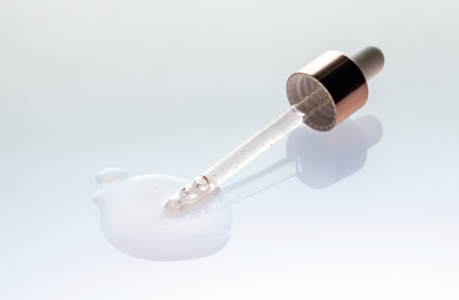Scientists reveal the truth behind ‘miracle’ skincare ingredient
Hyaluronic acid, a common ingredient in many skincare products, has been hailed a 'miracle' for its supposed ability to smooth wrinkles, enhance skin elasticity, and boost hydration.
However, recent scientific research revealed that the benefits of this popular skincare ingredient may have been significantly oversold.
Hyaluronic acid is a naturally occurring substance in the human body. It's found in the highest concentrations in the skin, eyes, and joints, where it helps retain moisture, lubricate, and aid in wound healing.
As we age, our natural levels of hyaluronic acid decrease, which can contribute to the appearance of wrinkles and conditions such as osteoarthritis.
In the skincare industry, hyaluronic acid is often touted for its ability to hold up to 1,000 times its weight in water.
This claim has led to its widespread use in products such as serums and moisturisers, with brands promising that it can 'lock in' hydration, make the skin 'bouncy', and reduce fine lines and wrinkles.
However, a team of researchers from the University of California, Riverside, has challenged these claims.
Scientists Scott Borchers and Michael Purring conducted a series of tests to measure the molecule-binding properties of hyaluronic acid and water.
They found that the results were almost indistinguishable from the thermal changes that occur within pure water during the same tests.
'No experimental evidence was found for any special ability of hyaluronic acid to bind water at the claimed level of a thousand times by weight,' the researchers said.
'The origin of the fallacy that it binds water at that level can be traced to older literature that has been misunderstood for the meaning of binding, as compared to other physical properties such as hydrodynamics,’ they explained.
In fact, previous studies have suggested that the amount of water hyaluronic acid can trap is closer to 20 or 30 times its weight—a far cry from the 1,000 times often claimed by skincare brands.
Oliver Jones, from the Royal Melbourne Institute of Technology in Melbourne, told the New Scientist that while most chemists probably already suspected the claims were overstated, it is useful to explicitly correct customers who may be misled.
In light of this new information, it is important to remember that skincare is not a one-size-fits-all solution. What works wonders for one person may not have the same effect on another.
It's always best to consult with a dermatologist or skincare professional to determine the best products for your individual skin needs.
Moreover, while topical skincare products can help improve the appearance of your skin, they can't replace a healthy lifestyle.
Drinking plenty of water, eating a balanced diet, getting regular exercise, and protecting your skin from the sun are all crucial for maintaining healthy, youthful-looking skin.
So, while hyaluronic acid may not be the 'miracle' ingredient it's often made out to be, it's still a valuable addition to many people's skincare routines.
Just remember to take marketing claims with a grain of salt and do your own research to make informed decisions about your skincare.

What are your thoughts on this revelation about hyaluronic acid? Do you use it in your skincare regimen? Share your experiences in the comments below.
However, recent scientific research revealed that the benefits of this popular skincare ingredient may have been significantly oversold.
Hyaluronic acid is a naturally occurring substance in the human body. It's found in the highest concentrations in the skin, eyes, and joints, where it helps retain moisture, lubricate, and aid in wound healing.
As we age, our natural levels of hyaluronic acid decrease, which can contribute to the appearance of wrinkles and conditions such as osteoarthritis.
In the skincare industry, hyaluronic acid is often touted for its ability to hold up to 1,000 times its weight in water.
This claim has led to its widespread use in products such as serums and moisturisers, with brands promising that it can 'lock in' hydration, make the skin 'bouncy', and reduce fine lines and wrinkles.
However, a team of researchers from the University of California, Riverside, has challenged these claims.
Scientists Scott Borchers and Michael Purring conducted a series of tests to measure the molecule-binding properties of hyaluronic acid and water.
They found that the results were almost indistinguishable from the thermal changes that occur within pure water during the same tests.
'No experimental evidence was found for any special ability of hyaluronic acid to bind water at the claimed level of a thousand times by weight,' the researchers said.
'The origin of the fallacy that it binds water at that level can be traced to older literature that has been misunderstood for the meaning of binding, as compared to other physical properties such as hydrodynamics,’ they explained.
In fact, previous studies have suggested that the amount of water hyaluronic acid can trap is closer to 20 or 30 times its weight—a far cry from the 1,000 times often claimed by skincare brands.
Oliver Jones, from the Royal Melbourne Institute of Technology in Melbourne, told the New Scientist that while most chemists probably already suspected the claims were overstated, it is useful to explicitly correct customers who may be misled.
In light of this new information, it is important to remember that skincare is not a one-size-fits-all solution. What works wonders for one person may not have the same effect on another.
It's always best to consult with a dermatologist or skincare professional to determine the best products for your individual skin needs.
Moreover, while topical skincare products can help improve the appearance of your skin, they can't replace a healthy lifestyle.
Drinking plenty of water, eating a balanced diet, getting regular exercise, and protecting your skin from the sun are all crucial for maintaining healthy, youthful-looking skin.
So, while hyaluronic acid may not be the 'miracle' ingredient it's often made out to be, it's still a valuable addition to many people's skincare routines.
Just remember to take marketing claims with a grain of salt and do your own research to make informed decisions about your skincare.
Key Takeaways
- Scientists have challenged the widely accepted claims about the benefits of hyaluronic acid for wrinkle reduction and skin hydration.
- New research suggested that hyaluronic acid does not trap as much water as often claimed, claiming that its ability to hold 1,000 times its weight in water is exaggerated.
- A study by the University of California found no evidence to support the claim of hyaluronic acid's extreme water-binding capacity.
- Despite the debunked claim, hyaluronic acid still plays an important role in skin moisture retention.








